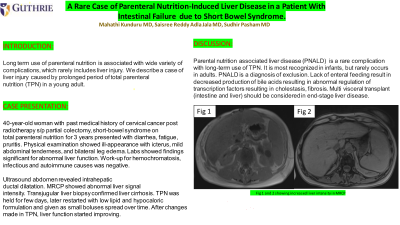Sunday Poster Session
Category: Liver
P1077 - A Rare Case of Parenteral Nutrition-Induced Liver Disease in a Patient With Intestinal Failure Due to Short Bowel Syndrome
Sunday, October 22, 2023
3:30 PM - 7:00 PM PT
Location: Exhibit Hall

Has Audio
- MK
Mahathi Kunduru, MBBS
Guthrie Robert Packer Hospital
Sayre, PA
Presenting Author(s)
Mahathi Kunduru, MBBS1, Sudhir Pasham, MBBS2, Saisree Reddy Adla Jala, MD3
1Guthrie Robert Packer Hospital, Sayre, PA; 2Robert Packer Hospital, Sayre, PA; 3Centinela Hospital Medical Center, Los Angeles, CA
Introduction: Parenteral nutrition is required in individuals who are not candidates for enteral feeding. Long term use is in decreased intestinal function, also called as intestinal failure. It is associated with wide variety of complications, which rarely includes liver injury. We describe a case of liver injury caused by prolonged period of total parenteral nutrition in a young adult due to intestinal failure secondary to short bowel syndrome. Parenteral nutrition induced liver disease is a rare but a life threatening condition, early recognition with prompt treatment is required before the development of end stage liver disease.
Case Description/Methods: 40-year-old woman with past medical history significant for cervical cancer post chemoradiotherapy followed by radiation colitis s/p partial colectomy with ostomy, short-bowel syndrome on Total parenteral nutrition (TPN) for 3 years presented with diarrhea, fatigue, pruritis. Physical examination showed thin body habitus, icterus, mild abdominal tenderness, and bilateral lower limb edema. Labs showed conjugated hyperbilirubinemia, elevated liver enzymes, low albumin, elevated INR, worsening creatinine.. Hepatitis panel negative. Iron studies negative for hemochromatosis. Negative for ANA, AMA, p- ANCA, ASMA, CMV. Ultrasound revealed intrahepatic ductal dilatation. MRCP showed abnormal liver signal intensity likely secondary to fibrosis, splenomegaly due to portal hypertension. Transjugular liver biopsy confirmed liver cirrhosis. Liver injury was considered to be secondary to TPN. TPN was initially held for few days, later restarted with low lipid, hypocaloric formulation and given as small boluses spread over time. Her liver enzymes and liver function markers improved. She was discharged with a long-term plan for multivisceral transplant.
Discussion: Parental nutrition associated liver disease (PNALD) is a rare complication with long-term use of TPN. Lack of enteral feeding result in decreased production of bile acids, which result in altered expression of transcription factors, resulting in cholestasis, fibrosis. Lipid formulation in the TPN is also associated with liver injury with an unknown mechanism.PNALD is a diagnosis of exclusion. In patients who have developed end-stage liver disease, multivisceral transplant (intestine and liver) should be considered.
Disclosures:
Mahathi Kunduru, MBBS1, Sudhir Pasham, MBBS2, Saisree Reddy Adla Jala, MD3. P1077 - A Rare Case of Parenteral Nutrition-Induced Liver Disease in a Patient With Intestinal Failure Due to Short Bowel Syndrome, ACG 2023 Annual Scientific Meeting Abstracts. Vancouver, BC, Canada: American College of Gastroenterology.
1Guthrie Robert Packer Hospital, Sayre, PA; 2Robert Packer Hospital, Sayre, PA; 3Centinela Hospital Medical Center, Los Angeles, CA
Introduction: Parenteral nutrition is required in individuals who are not candidates for enteral feeding. Long term use is in decreased intestinal function, also called as intestinal failure. It is associated with wide variety of complications, which rarely includes liver injury. We describe a case of liver injury caused by prolonged period of total parenteral nutrition in a young adult due to intestinal failure secondary to short bowel syndrome. Parenteral nutrition induced liver disease is a rare but a life threatening condition, early recognition with prompt treatment is required before the development of end stage liver disease.
Case Description/Methods: 40-year-old woman with past medical history significant for cervical cancer post chemoradiotherapy followed by radiation colitis s/p partial colectomy with ostomy, short-bowel syndrome on Total parenteral nutrition (TPN) for 3 years presented with diarrhea, fatigue, pruritis. Physical examination showed thin body habitus, icterus, mild abdominal tenderness, and bilateral lower limb edema. Labs showed conjugated hyperbilirubinemia, elevated liver enzymes, low albumin, elevated INR, worsening creatinine.. Hepatitis panel negative. Iron studies negative for hemochromatosis. Negative for ANA, AMA, p- ANCA, ASMA, CMV. Ultrasound revealed intrahepatic ductal dilatation. MRCP showed abnormal liver signal intensity likely secondary to fibrosis, splenomegaly due to portal hypertension. Transjugular liver biopsy confirmed liver cirrhosis. Liver injury was considered to be secondary to TPN. TPN was initially held for few days, later restarted with low lipid, hypocaloric formulation and given as small boluses spread over time. Her liver enzymes and liver function markers improved. She was discharged with a long-term plan for multivisceral transplant.
Discussion: Parental nutrition associated liver disease (PNALD) is a rare complication with long-term use of TPN. Lack of enteral feeding result in decreased production of bile acids, which result in altered expression of transcription factors, resulting in cholestasis, fibrosis. Lipid formulation in the TPN is also associated with liver injury with an unknown mechanism.PNALD is a diagnosis of exclusion. In patients who have developed end-stage liver disease, multivisceral transplant (intestine and liver) should be considered.
Disclosures:
Mahathi Kunduru indicated no relevant financial relationships.
Sudhir Pasham indicated no relevant financial relationships.
Saisree Reddy Adla Jala indicated no relevant financial relationships.
Mahathi Kunduru, MBBS1, Sudhir Pasham, MBBS2, Saisree Reddy Adla Jala, MD3. P1077 - A Rare Case of Parenteral Nutrition-Induced Liver Disease in a Patient With Intestinal Failure Due to Short Bowel Syndrome, ACG 2023 Annual Scientific Meeting Abstracts. Vancouver, BC, Canada: American College of Gastroenterology.
